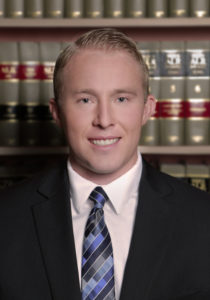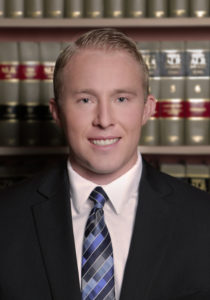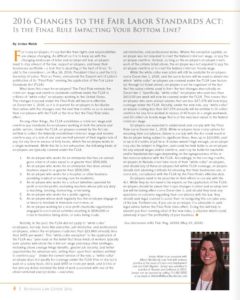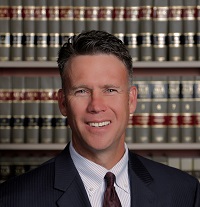Tips to Successfully Start and Run a Family-owned Business
Allison MacKenzie Associate, Will Wagner Explores the Challenges of Running a Family-owned Businesses
Running a family-owned business can present both advantages and disadvantages while competing in the marketplace. Family dynamics in a business can add complexity to operations that competitors may not be burdened with. However, the personal and financial payoff can be immense for businesses that overcome common obstacles and pitfalls of working with family members.
Practical and legal suggestions for successfully operating a family-owned business include
Creating Structure:
While family-owned businesses often begin as a hobby or an idea among family members, as the business grows, it is imperative to create a legal structure to operate efficiently. Be sure to establish yours by creating an entity, registering with the Secretary of State’s Office, establishing separate bank accounts, and developing a business plan.
Establishing Clear Roles:
Make these roles as “official” as possible by creating titles and providing business cards. It would be prudent to require a family member to sign the same employment agreement that non-family employees sign, and subject family members to the same performance reviews as non-family employees.
Balancing Family vs Work Time:
Establish clear working hours and keep some family activities work free.
Creating a Succession Plan:
Plan ahead and have an exit strategy.
Read the complete article at: Northern Nevada Business Weekly
Kevin Benson, attorney with Allison MacKenzie Law Firm
Allison MacKenzie Law Firm is pleased to announce the hiring of Kevin Benson as an associate attorney effective March 1, 2017. A Carson City native and former State of Nevada Senior Deputy Attorney General, Kevin joins the law firm and will focus his areas of practice on civil litigation, appeals, administrative and regulatory matters, election law, and ballot measures.
Upon graduating from Carson High School, Kevin attended the University of Nevada, Reno, where he obtained a degree in Criminal Justice with a minor in Biology in 2001. In 2004, he obtained his Juris Doctor Degree from Rutgers School of Law in New Jersey. Committed to returning to the area and serving fellow Nevadans, Kevin accepted a position with the State of Nevada Attorney General’s office where he worked for over a decade. There, he rose to the position of Senior Deputy Attorney General.
Read the compete article at: CarsonNow.org
Allison MacKenzie Attorney, Will Wagner, Explores Non-Compete Provisions
In a July 2016 opinion, Golden Road Motor Inn, Inc. v. Islam (“Golden Road”), the Nevada Supreme Court pronounced a new legal rule regarding the enforceability of overbroad non-compete provisions in Nevada. In light of Golden Road, it would be prudent for any entity conducting business in the State that relies on non-compete provisions to reevaluate the scope of such agreements to ensure they remain enforceable.
A non-compete provision is a contractual clause that prevents an employee from joining a competitor following the termination of employment. Non-compete provisions are important to businesses that use sensitive information such as proprietary client lists or similar trade secrets. These provisions also protect a business’s investment in training and retaining quality employees, while deterring competitors from luring valuable workers.
Non-Compete Provisions can be Overbroad in Timeframe or Geographical Scope Restrictions
Typically, the state’s laws in which the employee works will govern a non-compete provision. Non-compete laws vary widely from state to state as to enforceability and overbreadth. For instance, in California, under most circumstances a non-compete provision is unenforceable and cannot restrict an employee from joining a competitor. The primary exception to this being that when a business is sold, the selling entity and its employees can be restricted from competing. Many other states, including Nevada, allow non-compete provisions generally (both in the normal course of business and while a business is being sold) so long as the scope is reasonable and germane to the organization’s interests.
For the complete article, visit: Northern Nevada Business Weekly.
Will Wagner joined Allison MacKenzie Law Firm in 2016. He is a native Nevadan and University of Nevada, Reno graduate. Will pursued and obtained his law degree from the Sandra Day O’Connor College of Law at Arizona State University where he graduated cum laude. Upon graduating from law school, he served as a law clerk to Justice James W. Hardesty on the Supreme Court of Nevada. He was admitted to practice law in Nevada in 2015, and California in 2016. Will’s areas of legal practice include Business, Real Estate, Employment, Appellate, and Administrative Law.
Will Wagner Joins Allison MacKenzie Law Firm
Fernley native Will Wagner accepted an associate position with Allison MacKenzie Law Firm in Carson City, effective Sept. 12 of this year. Wagner will focus his practice in business, real estate, employment, appellate practice, commercial litigation, governmental affairs and administrative law.
Upon graduating from Fernley High School, Wagner attended the University of Nevada, Reno where he began his studies in biochemistry before ultimately deciding to become an attorney and pursuing a degree in political science with a minor in business administration. In 2015, he obtained his Juris Doctor Degree from Sandra Day O’Connor College of Law at Arizona State University where he graduated cum laude. He returned to the area and began his legal career as a law clerk for Justice James W. Hardesty at the Supreme Court of Nevada.
See the complete article: Nevada Appeal
Family Law Series: Modification of Child Custody and Visitation
Kyle Winter is a Nevada native and attorney at Allison MacKenzie Law Firm in Carson City. This home grown talent focuses his practice in the areas of Family Law, Estate Planning, Guardianships and Probate Law and recently completed his third article, and follow up article to Understanding Child Support Basics, in the Family Law Series: Modification of Child Custody and Visitation.
Please see the complete article below or visit: The Nevada Appeal.
More often than not, divorce and separation leaves parties in a difficult situation having to make decisions immediately, most frequently involving their minor children. Importantly, and until a Court order is entered to the contrary, each parent is considered to be a joint legal and joint physical custodian, meaning each is entitled to be with the children on an equal basis. As discussed in a previous article, the initial custody determination is important, for it sets the standard that serves as the basis for future determinations, including the time when a parent seeks to modify the current custody and visitation arrangement.
Generally speaking, once the custody and visitation of a minor child has been determined by a court of competent jurisdiction, that court retains and exercises continuing and exclusive jurisdiction to modify or vacate its prior order or decree until the child reaches age 18. However, and because a change in custody can be traumatic for a child and tends to undermine the stability and continuity the child has come to enjoy and need, Nevada courts don’t lightly entertain requests for change. Based on this understanding, and always considering the best interest of the child, the standard used by the court to determine whether a change in custody is warranted depends on the type of custodial arrangement that has been previously ordered or agreed upon by the parties.
For instance, if the Court has awarded joint physical custody and a parent later desires to become the primary physical custodian, the court must determine whether such a change is in the child’s best interest. In Nevada, the court considers numerous factors in determining a child’s best interest, including but not limited to, (a) the wishes of the child if the child is of sufficient age, (b) a nomination of a guardian for the child by a parent; (c) which parent is more likely to allow the child to have frequent associations and a continuing relationship with the other parent; (d) the level of conflict between the parents and the ability of the parents to cooperate to meet the needs of the child; (e) the mental and physical health of the parents and the child; (f) the nature of the relationship of the child with each parent; (g) the ability of the child to maintain a relationship with any sibling; and (h) any history of parental abuse or neglect or whether either parent or other party has engaged in an act of domestic violence or committed any act of abduction. If after careful consideration of these factors, the Court determines it would be in the child’s best interest to modify custody from a joint custodial arrangement to a primary physical custodial arrangement, it will do so.
On the other hand, if the court has awarded one parent primary physical custody and provided the other parent reasonable visitation, the standard the court will consider in determining whether modification is appropriate is drastically different. In addition to proving a modification would be in the child’s best interest using the factors explained above, the moving party must also prove there’s been a substantial change in circumstances affecting the welfare of the child. This additional “substantial change in circumstances” prong serves the important purpose of guaranteeing stability for the child and requires the party seeking the modification to prove both prongs. Moreover, the substantial change in circumstances must generally have occurred since the last custody determination, preventing a dissatisfied party from filing immediate, repetitive motions until the desired result is achieved.
2016 Changes to the Fair Labor Standards Act: Is the Final Rule Impacting Your Bottom Line?
Jordan Walsh is an associate with Allison MacKenzie Law Firm and was asked to explore the Fair Labor Standards Act for Northern Nevada Business Weekly. Her analysis can be found in the 2016 Business Law Publication or read below.
For many employers, it may feel like their rights and responsibilities are always changing. As difficult as it is to keep up with the changing landscape of labor and employment law, employers need to stay abreast of the law, support employees, and keep their businesses profitable – a task that is daunting at the best of times. To add to the conundrum, on May 18, 2016, President Obama and the U.S. Secretary of Labor, Thomas Perez, announced the Department of Labor’s publication of its “Final Rule” revising the application of the Fair Labor Standards Act (FLSA).
What does this mean for employers? The Final Rule extends the minimum wage and overtime standards outlined under the FLSA to millions of “white collar” employees working in the United States. The changes imposed under the Final Rule will become effective on December 1, 2016, so it is important for employers to familiarize themselves with the changes over the next few months so as to ensure their compliance with the FLSA at the time that the Final Rule takes effect.
Among other things, the FLSA establishes a minimum wage and overtime pay standards for employees working in both the private and public sectors. Under the FLSA, employees covered by the Act are entitled to collect the federally established minimum wage and receive overtime pay, at a rate of one and one-half percent of their regular rate of pay, for any time in excess of forty hours, which the employee works in a single workweek. While this list is not exhaustive, the following kinds of employees are typically covered under the FLSA:
1. An employee who works for an enterprise that has an annual gross volume of sales equal to or greater than $500,000.00;
2. An employee who works for an enterprise that does annual business equal to or greater than $500,000.00;
3. An employee who works for a hospital, or other business providing medical or nursing care for residents;
4. An employee who works for a school (whether operated for profit or not-for-profit), excluding teachers whose primary duty is teaching, tutoring, instructing, or lecturing.
5. An employee who works for a public agency;
6. An employee whose work regularly has the employee engage in or become involved in interstate commerce; or
7. An employee working for a non-profit charitable organization engaged in commercial activities resulting in $500,000.00 or more in business being done, or sales being made.Notably, in the past, the FLSA did not apply to “white collar” employees; namely, bona fide executive, administrative, and professional employees, unless the employees made less than $23,660.00 annually (less $455.00 per week). This “white collar exception” to the application of the FLSA was “premised on the belief that these kinds of workers typically earn salaries well above the minimum wage and enjoy other privileges, including above average fringe benefits, greater job security, and better opportunities for advancement, setting them apart from workers entitled to overtime pay.” Under the current version of the rule, a “white collar” employee does not qualify for coverage under the FLSA if he or she (a) is paid on a salary basis, (b) is paid $455.00 or more per week, and (c) his or her primary duties involved the kind of work associated with one of the aforementioned exempt duties – executive, administrative, and professional duties. Where this exception applied, an employer was not required to meet the federal minimum wage, or pay the employee overtime. Instead, so long as the employer’s employee meets each of the criteria listed above; the employer was not required to pay the employee overtime or to meet the federal minimum hourly wage.
While the white collar exemption will still be available for employers come December 1, 2016, and the same factors will be used to determine which “white collar” employees are covered under the FLSA (see factors (a) through (c) listed above), employers must be cognizant of the fact that the salary criteria used to from the test changes dramatically on December 1st. Specifically, “white collar” employees who earn less than $913.00 per week will now be covered under the FLSA. This means that employees who earn annual salaries that are less $47,476.00 will now enjoy coverage under the FLSA. Notably, under the new rule, any “white collar” employee making less than $47,476.00 annually will be entitled to (i) collect overtime for any time worked in excess of 40 hours in a single workweek, and (ii) collect an hourly wage that is at the very least equal to the federal minimum wage.
Employers are expected to understand and comply with the Final Rule come December 1, 2016. While employers have many options for ensuring their compliance, failure to comply with the Act could result in the employer being subject to significant fines, fines up to $10,000.00; and/or up to 6 months of jail time. If stakes weren’t high enough, an employer may also be subject to litigation, and could be held liable to an employee for any unpaid wages and/or overtime, and may be liable for equitable and/or liquidated damages depending on the egregiousness of his or her non-compliance with the FLSA. Accordingly, in the coming months, employers in Nevada must take stock of their “white collar” employees, and should any of these employees fall within FLSA coverage, employers should start planning methods for ensuring that their businesses are, or come into, compliance with the FLSA by the Final Rule’s effective date.
Employers need to be proactive in their efforts to comply with the Act. While they do not need to be experts on the application of the FLSA; employers should be aware that major changes to labor and employment law will be taking effect come December 1st, and should they have any questions or concerns regarding their compliance with the law, they should seek legal counsel to assist them in navigating this complex area of the law. Furthermore, if you are an employer, it is advisable to seek legal advice before the Final Rule takes effect. Doing this will help to prevent you from running afoul of the new rules, a situation which could adversely impact the profitability of your business.
About Jordan Walsh
Jordan Walsh is an associate with Allison MacKenzie Law Firm with primary practice in the areas of Labor and Employment Law and Civil Litigation. Jordan was admitted to practice in Nevada and California in 2014. Jordan can be reached by calling 775.687.0202 or by email at JWalsh@allisonmackenzie.com.
What Does Affordable Healthcare Mean to Nevadans?
The Affordable Care Act was designed to require that each American is covered by health insurance. With this legislation, individuals are required to obtain coverage or pay a penalty, and large employers are required to offer affordable health plans that offer certain minimal coverage or face penalties. But what does this really mean to Nevada families? And, how does it impact area businesses?
Mike Pavlakis, a shareholder in the Allison MacKenzie Law Firm, recently explored these questions in an article for Northern Nevada Business Weekly.
Affordable health care for all Americans. A free and appropriate education for American children. Both are laudable goals. But what do these initiatives imply and how do they impact northern Nevada businesses and residents?
The Affordable Care Act was designed to require that each American is covered by health insurance. With this legislation, individuals are required to obtain coverage or pay a penalty, and large employers are required to offer affordable health plans that offer certain minimal coverage or face penalties. Further, insurance companies are required to provide coverage regardless of preexisting conditions, and parents are allowed to insure their children as dependents to age 26.
Some have said the employer mandate has caused some employers to rely more heavily on part-time employees, for whom insurance coverage is not required, and others claim the insurance mandate has resulted in higher premiums. To my knowledge, no one has said the goal of trying to provide affordable care for more Americans is not a worthwhile goal. Rather, the challenge is in the approach.
The Affordable Care Act has resulted in new and greater impacts on hospitals and health care providers. Reimbursements are being reduced, and expectations are growing. Expectations of both consumers and payers, including the federal government are taking the form of payment and withholding of payment. At the same time that providers are facing growing volumes due to the growing number of insured parties, their reimbursements are being reduced, and they are being required to assume greater risk. For example, hospital reimbursements are reduced for readmissions, and they are being asked to accept a single payment for an “episode of care” that will include a single payment to be shared with physicians, therapists, and others for care provided over an extended period of time.
In addition, the law offers rewards and penalties for patient satisfaction. Thus, in a world of transparency, “hospital compare” and “health grades” websites are the Yelp for doctors and hospitals. Is this good? Is this right? Time will tell.
Compare this with what is happening in education. The Every Student Succeeds Act has replaced No Child Left Behind. The goal is to prepare all students for college and careers through a program of grants and supports. The law provides for more assessment (testing), seeks to hold educators (teachers) accountable, and includes support for pre-kindergarten education.
However, most public schools rely on state and local support, so the federal law is in addition to the requirements of state law. In Nevada, this means that educators will be facing evaluations that include a component based upon the “success” of their students. The Nevada State Department of Education and local school districts have been wrestling with the components of what those measurements will include for months. Not all students and classrooms are equal in terms of ability and skills, and how that fact will relate to educator evaluations, and how those evaluations will relate to the educators’ success or failure has yet to unfold. Likely, however, is that those results will be available to the public, and may form the basis for choices.
Nevadans have seen the next generation of change in education with the educational savings accounts approved by the last session of the Nevada legislature. Their future currently is in the hands of the Nevada Supreme Court, which heard arguments on the constitutionality of the law last week.
What do these two Acts have in common? Both have laudable goals: the availability of affordable care for all Americans, and the availability of a public education which prepares every child for the world of work and/or college education. Both seek to do so through federal government incentives and penalties designed to influence behavior. Both have significant economic impacts upon the public. Both have major impacts upon the institutions and the people who provide the service of healthcare or education.
The ultimate benefit of these programs is yet to be seen.
However, from what we see in northern Nevada, our institutions and those involved with them, continuously strive to provide exceptional health care to area residents. Our local hospitals, with the various affiliated and non-affiliated providers, make available to us the best quality of healthcare through providers and modalities ranging from dermatology, to cancer care, to open heart surgery. Regional care centers have been recognized for their exceptional quality heart care by the American Heart Association, and Carson Tahoe just announced its grand opening for the new Breast Exam Center.
Governor Sandoval has made education a top priority for the Silver State. The University of Nevada, Reno is responding to this call and is currently in the process of creating a new Master of Physician Assistant Program to aid not only the education and work force development but also to assist in the ever increasing demand for medical care providers. Additionally, new emphasis in STEM (Science, Technology, Engineering, and Math Education) has been placed in area school districts such as the STEM Academy at Galena High School, and Carson High School’s Career and Technical Education center is expanding to include curriculum in manufacturing. These efforts are a testament to our local institutions and will continue to aid job force development, graduation rates and education levels of Nevadans.
Northern Nevada’s dedication to both affordable quality healthcare and education and work force development shows that despite the pressures of increased governmental regulation, our institutions are thriving. Further, with this continued commitment and enthusiasm, more people are relocating to the area and our economy will continue on its road to recovery.
A Family Law Series: Understanding Child Support Basics
Kyle Winter is a Nevada native and attorney at Allison MacKenzie Law Firm in Carson City. This home grown talent focuses his practice in the areas of Family Law, Estate Planning, Guardianships and Probate Law and recently completed his second article in the Family Law Series: Understanding Child Support Basics. Please see the complete article below or visit: The Nevada Appeal.
There is little argument that every child needs financial and emotional support to grow and flourish. As the parent, it is your duty to support your children from the time of birth, including pregnancy and birth related expenses, until the child reaches the age of majority (in Nevada, 18 years of age) and is no longer enrolled in high school. This obligation is true even if the parents are not married and even when one parent has not been, or is not involved in the child’s life. Although there are exceptions to this scenario, this is the case for most family situations.
As indicated in the first article of this series, Joint Petitions and the Initial Custody Determination, the custodial arrangement affects the amount of child support that may be awarded in any case. For instance, child support will be calculated differently between parents who share joint legal custody and situations where one parent is the primary custodian and the other is awarded visitation rights. Specifically, when parents share joint physical custody, each parent is required to provide a minimum level of support for his or her child, specified by the legislature as a percentage of gross income, depending on the number of children, and absent special circumstances (18% for one child; 25% for two children; 29% for three children; 31% for four children; and an additional 2% for each additional child). The Court will calculate the appropriate percentage of gross income for each parent, subtract the difference between the two, and require the parent with the higher income to pay the parent with the lower income that difference. On the other hand, when one parent has primary physical custody and the other has visitation rights, the noncustodial parent will be required to pay the appropriate percentage of gross income as provided above.
Once the appropriate formula is used to determine the presumptive amount of child support, the Court has the authority in certain situations to deviate from these amounts. In considering whether a deviation is necessary, the Court will consider numerous factors including: the cost of health insurance and child care; the special education needs of the child, if any; the legal responsibly of the parents to support others; any public assistance paid to support the child; the cost of transportation to and from visitation; the relative income of both parents; and the amount of time the child spends with each parent. However, and unless specific written findings are made relevant to these factors supporting a deviation, application of the formulas enumerated above is mandatory.
Importantly, once an order for child support has been entered, review of that order must be made upon request of either parent at least every 3 years or upon a showing of changed circumstances. For purposes of modification, the law provides that a change of twenty percent or more in the gross monthly income of a parent who is subject to an order for the support of a child constitutes changed circumstances requiring a review for modification. Upon such review, or in the event someone is found to have become willfully underemployed to avoid his or her child support obligation, the Court can modify the prior support award and impute a gross monthly income on one of the parties, if it determines necessary.
If you are a parent, it is important that you understand your rights and responsibilities in regards to family law and child support. The experienced team of attorneys at Allison MacKenzie are here to provide representation in all family law matters, including the proper determination of child support. Should you require more information or have questions, please visit: allisonmackenzie.com or call: 775.687.0202.
After graduating from Carson High School, Kyle attended the University of Nevada, Reno. In 2009, he graduated with a degree in Criminal Justice and an emphasis in Philosophy. In 2013, he obtained his Doctor of Jurisprudence Degree from Gonzaga University, located in Spokane, Washington. Dedicated to serving the Northern Nevada community, Kyle returned to the area to begin his legal career clerking for the Honorable James E. Wilson, Jr. at Nevada’s First Judicial District Court, in Carson City, and then for the Honorable Jerome M. Polaha at Nevada’s Second Judicial District Court, in Reno.
In Jordan Walsh’s recent article Navigating Lake Tahoe Development, she explores changes in the area and what pitfalls potential developments should be aware of. Development in the region is complicated but not impossible and understanding how to “redevelop” and “revitalize” within current regulations is vital for individuals looking to develop sites within the Basin.
As visitor use has changed over the decades from gaming to experiential based adventures, the Basin is faced with new challenges in addressing projects that meet the needs of this new visitor while understanding and supporting the requirements of the community. Over the last decade, these communities have worked closely with the Tahoe Regional Planning Agency (TRPA) and community leaders to ensure that environmental health of the Basin is maintained while making the area is more accessible to visitors. Specifically, changes implemented within TRPA’s 2012 Regional Plan Update (RPU), received unprecedented community support during its development. The updates fostered a new emphasis on “sustainable communities” while promoting increased development in “urban centers.”
While these changes make it an exciting time for communities, developers, and citizens in the Basin, it is important to ensure that your project is operating in compliance with the requisite guidelines. If you are seeking to develop sites within the Lake Tahoe Basin or have questions about the planning and permitting process related to a project, contact Allison MacKenzie Law Firm. Jordan Walsh or one of our many talented attorneys are available to assist you in navigating the intricate and complicated regulatory landscape of the Tahoe Basin.
Read the complete article at: Northern Nevada Business Weekly.
Jordan Walsh is an associate with the Carson City based law firm of Allison MacKenzie. Primarily, she practices in the areas of Civil Litigation, Real Estate Law and Land Use Law. Jordan was admitted to practice in Nevada and California in 2014 and is knowledgeable about the unique challenges facing the Tahoe Basin. Jordan can be reached at 775.687.0202 or JWalsh@allisonmackenzie.com.
Allison MacKenzie Law Firm Partners Voted as Two of Northern Nevada’s Top Attorneys by Peers
Nevada Business Weekly recently announced the 2016 Legal Elite. For the past nine years, Legal Elite has highlighted Nevada’s top attorneys as selected by a community of their peers; only 3.7 percent of attorneys in the Silver State receive this coveted recognition. This year, over 6,000 nominations were received in four categories: Northern Nevada, Southern Nevada, The Best Up and Coming, and Top Government Attorneys. Allison MacKenzie Law Firm partners Chris MacKenzie and James Cavilia were voted as two of Northern Nevada’s Top Attorneys.
Chris and James are native Nevadans and received their undergraduate degrees from the University of Nevada, Reno. After graduating from the University of Idaho School of Law in 1993, Chris MacKenzie joined Allison MacKenzie and has been practicing law for 23 years. His practice primarily focuses on Business Law, including the areas of Contracts, Real Estate, Water Law, and Administrative Law. James Cavilia was admitted to practice in both Nevada and California after obtaining a law degree from Santa Clara University School of Law. He joined Allison MacKenzie Law Firm in 1992 and focuses his efforts on Real Property, Land Use, and Business Law.
The Legal Elite 2016 election process is complicated and thorough, ensuring that exceptional attorneys are recognized for their contributions to the legal field. After the nomination process is complete, all voting attorneys are vetted through the State Bar of Nevada to ensure eligibility and to confirm good standing within the state. Additionally, after final scores were tabulated, top nominees were verified with the State Bar of Nevada before final selection was announced.
To read the complete article, please visit: Nevada Business Weekly.
















